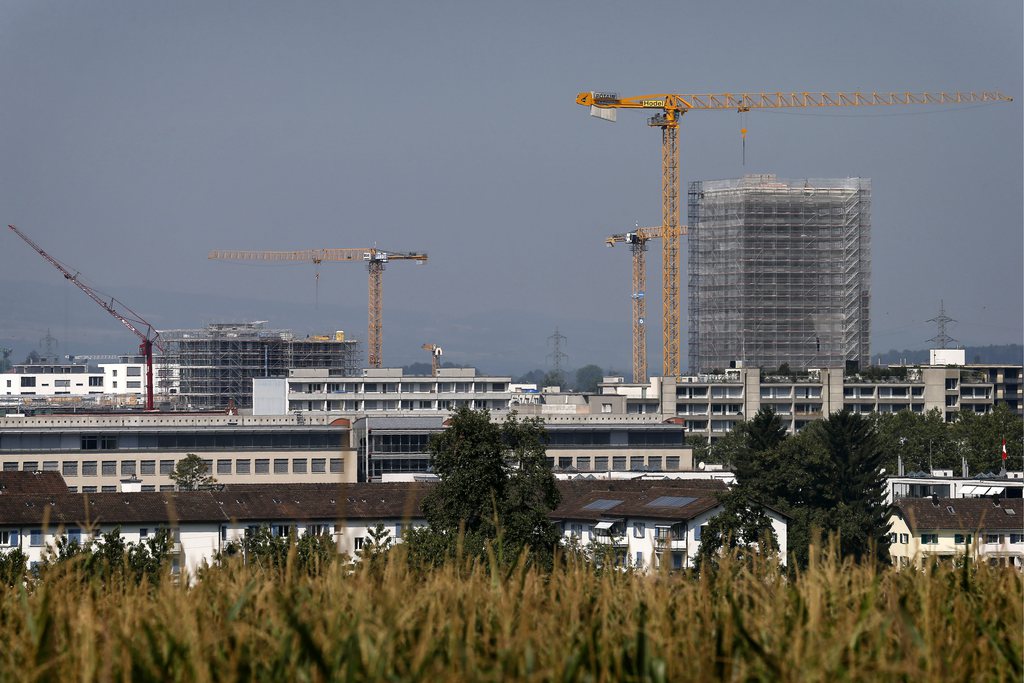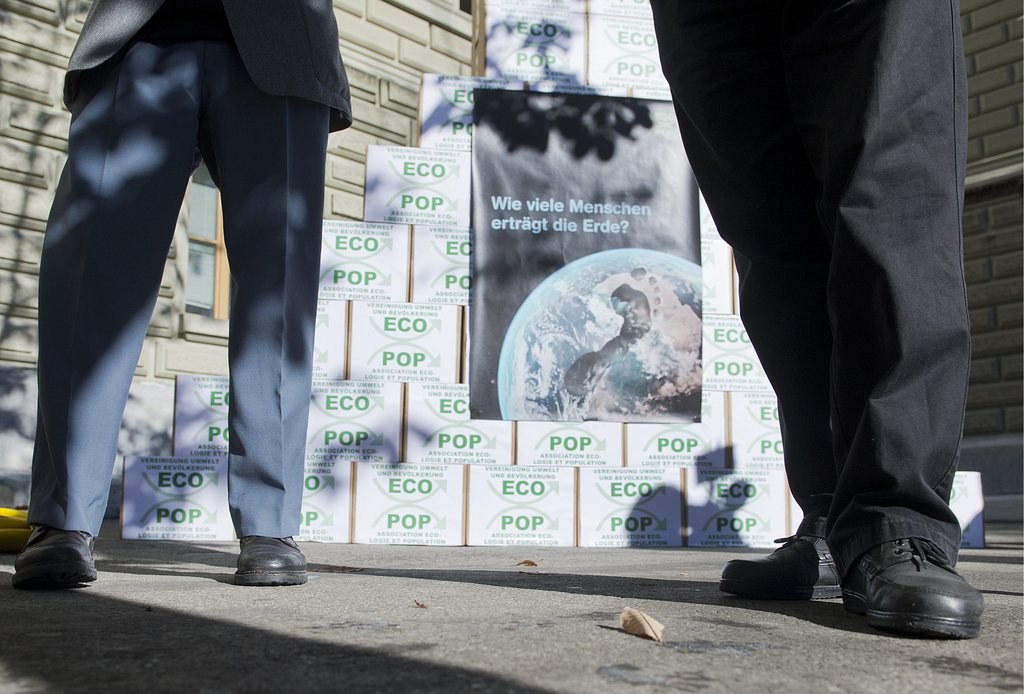Nature concerns drive anti-immigration plan

After February‘s vote in favour of limiting immigration, the Swiss are set to go to the ballot box again to decide on a proposal that would see fewer foreigners coming to live and work in Switzerland. This time, the goal is to curb population growth.
This people’s initiative has been launched by the Ecopop association, which wants to tackle population growth in Switzerland and all over the world in order to protect the environment from over-exploitation.
“I think it is to the credit of the [rightwing] Swiss People’s Party and the Swiss people that they had the confidence to make their decision despite the scaremongering of the Swiss Business Federation, economiesuisse, and the possible economic drawbacks,” says Andreas Thommen, head of the local council in Effingen, a village in northern Switzerland.
Thommen may sound like People’s Party strongman Christoph Blocher, but in fact he is a member of the Green Party.
“One square metre of ground is concreted over every second in Switzerland. I am personally very concerned about this,” says Thomas Zollinger, who is not a green tree-hugger, but a client adviser in a bank and the local chairman of the People’s Party branch in Würenlos, another village in the same region.
“We need to stop Switzerland giving tax breaks to foreign enterprises.” The words not of a leftwing political manifesto, but of Marianne Manzanell, who sits on the board of a family business near Chur in south-eastern Switzerland, and is a member of the centre-right Radical Party.
The Ecopop (Ecology and Population) association describes itself as an environmental organisation whose aim is to “preserve the natural resources and quality of life in Switzerland and the world for future generations”.
To this end it campaigns against overpopulation.
Its people’s initiative on ending overpopulation has brought it to public attention, although it was in fact established 40 years ago.
The proposal calls for annual immigration to Switzerland to be limited to 0.2% of the population and for Switzerland to invest 10% of its overseas development budget in voluntary family planning.
The Senate debated the initiative in the spring session of parliament and recommended voters reject it. The House of Representatives will still have to debate the proposal before it is put to a nationwide vote at the end of 2014 at the earliest, but probably not until 2015.
Too crowded
Manzanell, Thommen and Zollinger are all members of the committee behind Ecopop’s proposal.
What the three of them have in common and what motivates them to use even the arguments of their political opponents is their concern for the protection of nature, first and foremost in Switzerland, but also worldwide.
“I really don’t feel comfortable having so many people,” says Zollinger.
Thommen says he would like to keep “a little bit of greenery” in front of his house, while Manzanell is keen to avoid “a Manhattan between Lakes Constance and Geneva”. That is why they are all campaigning against population growth.
“In the world as a whole the problem is that more people are being born than are dying. In Switzerland it is that immigration rates are too high,” they all agree.
For the sake of the environment their initiative calls on the one hand for Switzerland to allocate 10% of its development budget to the promotion of voluntary family planning, in order to slow down the rise in the global population, and on the other, for the population in Switzerland to be stabilised as well.
If the supporters of the initiative get their way, net immigration – the number of immigrants minus the number of emigrants – would be reduced to 0.2% per year, the average population increase in Europe. Instead of the annual 80,000 increase today, in future the Swiss population would grow by no more than 16,000.
Marianne Manzanell
It’s crazy how we are driven by money. Wouldn’t it be possible to get by with less?
Vicious circle
Manzanell has personal experience of the prevalence of foreigners working in Switzerland.
“We had some alterations done to our house, and the electrician was the only one who wasn’t a foreigner. Whatever language all the others spoke, it wasn’t Swiss German,” she said. “And when our own firm advertises a job, we get countless applications from Germany.”
“Because there are so many foreigners coming, Switzerland needs more and more infrastructure, and in order to build it, we need more people and so it goes on. The work force being brought in by the nursing sector will one day need care themselves.”
She sees this as a vicious circle which must be halted, even if it is painful at first.
She would like to see an end not only to population growth in Switzerland and worldwide, but also to economic growth.
“It’s crazy how we are driven by money. Wouldn’t it be possible to get by with less?” She has a ready response to the question whether her own family business wouldn’t collapse within a few years without growth. “If we try to solve the world’s problems simply through growth, then the world will collapse!”
Alliance Sud, the umbrella organisation of development NGOs, rejects both aspects of the initiative, because “it is not possible to make environmental policy via population policy,” says director Peter Niggli.
“Limiting population in Switzerland makes no difference to the fact that the people who live here use rather more resources than can be renewed,” he says.
And the same applies to the world population. “If there were four billion Indians – in fact there are only 1.2 billion – they would produce as much CO2 emissions as the US, which only has a population of 313 million.”
As for family planning, there has long been a consensus among development agencies that “the most effective instruments in lowering birth rates are improving welfare, education, and giving women more political power”.
This requires a range of measures, and family planning is only one of them, said Niggli. “Switzerland is already investing more in these measures than the initiative supporters are demanding with their 10%.”
Business associations are also opposed to the initiative, describing it as incompatible with the agreement on the free movement of peoples, just as the controversial People’s Party initiative to re-introduce quotas.
They say it would harm the economy and Switzerland’s prosperity.
The Green Party is also opposed to the initiative, although unrepresentative polls have shown that a minority of grassroots members welcome it.
It is also rejected by the centre-left Social Democrats and the three centre-right parties: the Radicals, Christian Democrats and Conservative Democrats.
The People’s Party has not yet decided on its response.
The initiative is supported by the conservative Action for an Independent and Neutral Switzerland pressure group.
Consumption, wages
Thommen is also concerned about the future of the planet – “like all serious scientists”, as he puts it. If we want a sustainable world, population growth must be halted.
Asked what difference it makes to the environment if his German neighbour lives and drives his car in Switzerland rather than at home, Thommen has an answer.
“People come because of the prosperity, and then they consume more. If they live here, they consume twice as much.”
The impact on air quality is not evenly distributed, he says. “When long queues build up at the entrance to the Baregg tunnel [on a busy stretch of the nearby A1 motorway], we suffer from high ozone values, while not even our near neighbours in the Black Forest [in Germany, about 30 kilometres away] are affected.”
Zollinger is worried about wage dumping – an issue that normally mainly bothers trades unions.
“If unlimited cheap labour can be brought in, the necessary structural change won’t happen, because areas of the economy are kept going which otherwise wouldn’t be able to survive given the way wages are currently structured,” he suggests. Restaurants are a case in point.
“Today the unlimited pool of workers means you can open a café anywhere and employ them at dumping wages.” The way this wage structure is maintained needs to be challenged, he believes.
Green cards?
“At present it’s only the economy which decides how many people come to Switzerland,” says Thommen. “We want the state to take over responsibility for planning population growth.”
As for the exact steps to be taken, “we are purposely leaving that up to parliament. There are plenty of options.” But he has his own idea.
“A simple solution, which exists in all traditional countries of immigration, would be the introduction of a green card.”
Zollinger thinks it would be possible to control immigration by means of a trade in certificates, which would ensure that workers were allocated fairly.
“When an employee leaves Switzerland, the employer would get a certificate enabling him to take on another worker from abroad. If he didn’t need one, he could sell the certificate to another business.”
Manzanell thinks it is wrong to promote the economy through tax dumping. She doesn’t need companies which come in from outside, attracting mainly foreign workers, and paying no taxes.
“Switzerland shouldn’t simply follow the path dictated by business,” she says.
She knows that many of her party colleagues strongly disagree with her, but “there are also business people who think differently, and I’m one of them.”
(Adapted from German by Julia Slater)

In compliance with the JTI standards
More: SWI swissinfo.ch certified by the Journalism Trust Initiative












You can find an overview of ongoing debates with our journalists here . Please join us!
If you want to start a conversation about a topic raised in this article or want to report factual errors, email us at english@swissinfo.ch.